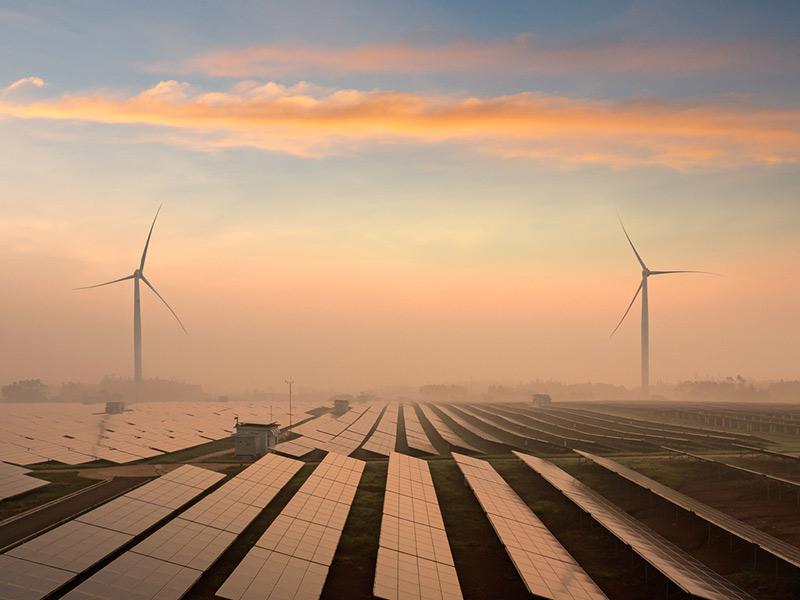A 21st-Century Social Contract Must Include a Just Transition to a Net-Zero Economy
How Business Can Protect Workers and Communities while Addressing the Climate Crisis

By: Samantha Harris, Global Lead, Climate and People, BSR
Drawn front and center and exacerbated by the many crises the world faces today—the COVID-19 pandemic, climate impacts, economic inequality, and the racial justice movement—it is clear that the current social contract is not fit for purpose. The ways in which institutions and individuals interact, including the way we do business, do not reflect reality, and they do not take into account the fundamental systemic inequalities, inequities, and discrimination that many across the globe face today. As Sharan Burrow, the General Secretary of the International Trade Union Confederation, wrote earlier this year: “The social contract is broken! Workers want a New Social Contract that delivers decent work for all.”
In June 2020, BSR released its report, The Business Role in Creating a 21st-Century Social Contract, which presents clear principles and actions business can take. One of the principles discussed in the report is: A Just Transition to Net-Zero Greenhouse Gas (GHG) Emissions.
Social contracts are the accepted roles and responsibilities of societal actors, including people, government, business, workers, and their representatives, and civil society organizations.
Put simply, we need to enact large-scale systemic changes to combat global climate change—and as the transition to a net-zero GHG emissions economy takes place, we need a social contract that addresses the impact on workers and their communities, especially those facing systemic inequities. Achieving the decarbonization targets must be done in a way that creates decent work and supports broad prosperity by maintaining strong economies and thriving communities.
We know that addressing the climate crisis will require a massive shift across systems in the ways we operate, physically, economically, and socially to reach net-zero GHG emissions by 2050. The necessary change will simultaneously create new jobs and opportunities; it is estimated that up to 65 million jobs and US$26 trillion in economic opportunities could be created by the transition to a net-zero GHG emissions economy in the next ten years. At the same time, the transition will unfortunately also spur significant job displacement and new migration patterns. In the U.K. alone, more than 2.2 million workers may need retraining and/or reskilling in order to meet the Paris Agreement goals. While the greatest impacts of this transition will be felt widely, the localized impacts on people and communities, if not managed justly and fairly, will be great for those that already face systemic inequities.
What can business do?
Business action, supported by government action through regulation, investment, and incentives, is needed to create high-quality green jobs and to procure renewable energy in order to drive the transition to a low-carbon economy. Business will need to consider other factors in this process, including upholding human rights, achieving racial and gender equity, and adhering to global labor standards through appropriate due diligence.
In addition, partnerships will be key to successfully bringing those most affected along in a just transition—business and government should partner to ensure that the shift to a net-zero GHG emissions economy can be a powerful engine for job creation, business innovation, and strong and resilient economies.
As we build recovery plans to address the current COVID-19 crisis, business and governments alike must include elements that address the multiple crises we face today holistically. This includes tackling the many systemic inequities that specific populations face today, including access to green, healthy jobs, access to healthcare, and ending structural racial and gender discrimination.
Businesses can specifically do the following:
- Act: Generate inclusive low-carbon employment opportunities and manage the impacts on workers transitioning from high-carbon roles.
- Commit to and implement science-based climate targets that align with a 1.5°C future with a just transition element. For example, companies can commit to the Business Pledge for Just Transition and Decent Green Jobs.
- Complete the necessary due diligence to ensure workers and communities are not left behind and human rights are upheld within climate strategies and projects.
- Enable: Advocate for policies that enable the generation of high-quality low-carbon jobs and that enable for those displaced from high-carbon roles to shift to new livelihoods.
- Participate in dialogues with governments to help set inclusive policies.
- Advocate for laws that protect jobs and ensure social equity while advancing the Paris Agreement goals (e.g. strong social protection programs and financial support to help dismissed workers retrain and find new jobs, policies to protect vulnerable groups, support for skills development for green sectors, and opportunities for early retirement packages for older workers).
- Advocate for COVID-19 economic recovery plans that prioritize the shift to a net-zero GHG emissions economy and that embrace a just transition.
- Influence: Work toward a just transition for people and communities through social dialogue and stakeholder engagement.
- Assess, identify, and disclose the Task Force on Climate-Related Financial Disclosures (TCFD)-aligned transition risks and opportunities affecting communities.
- Engage in dialogue with workers, communities, and their representatives to enable transition and mitigation of economic and social impacts.
- Work with government to ensure that the cost of the transition is not passed to low-income populations
- Consider ways to focus specifically on Black, Indigenous, People of Color and other marginalized groups that are impacted by the energy transition
The 2020s are the decisive decade in which we can change the way we do business, fundamentally transforming it to address the embedded systemic and structural flaws, including how we have been and will address the climate crisis. The urgency we face is now. The essential role that business must play in shaping and implementing this new 21st-century social contract starts now.
Now is the time to build a better, safer, and truly inclusive future that protects those most affected by crises, including through the tools of the necessary transition to a low-carbon economy.
Originally appeared on BSR.

